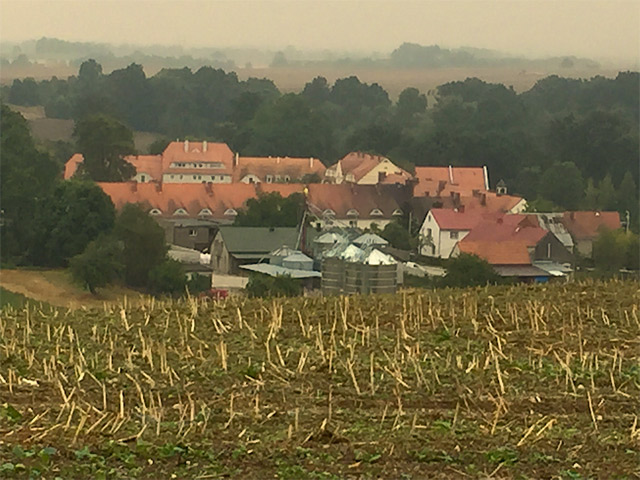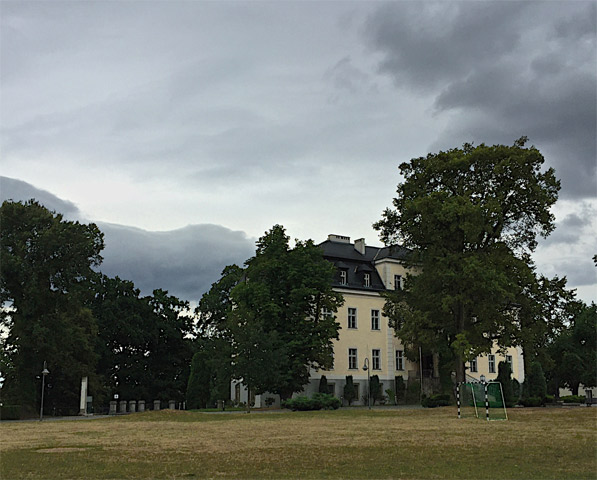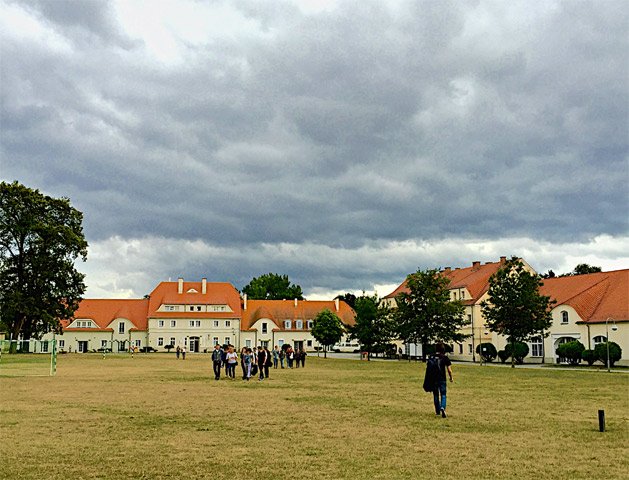
More Than a Music Festival
November 1, 2015
Late last summer, I traveled to Poland for a chamber music festival that took place in a small town called Krzizowa, or Kreisau as it was known as part of Germany until the Second World War ended. Knowing beforehand something of its background and the people involved, I eagerly looked forward to the festival. It was certainly going to be special, but not only for its vibrant music making.
The Kreisau Music Festival was the inspired idea of Vivian Hagner, an extraordinarily accomplished and thoughtful young German violinist, and her longtime friend, the pediatrician and cofounder of the Schleswig-Holstein Music Festival, Matthias von Hülsen. I had greatly enjoyed meeting and performing with Viviane at the Marlboro Music Festival in past summers. Viviane took as her inspiration the Marlboro idea of matching older, experienced musicians with young players in the study of the chamber music repertoire.
The festival took place on an estate that had been owned by the von Moltke family for almost 150 years. Anyone acquainted with German history would recognize the von Moltke name instantly. Helmuth Graf von Moltke (1800–1891) was a German field marshall and the chief of staff of the Prussian army for thirty years. With von Moltke’s extraordinary military successes behind him, he had acquired the Kreisau estate.

Kreisau seen from a nearby hill.
The von Moltke name is also known in an entirely different context, and in this case not associated with brilliant success on the battlefield. Helmuth James von Moltke (1906–1945), the last Moltke occupant at Kreisau, witnessed the Nazis up close as they came to power and quickly realized the threat they posed for the future of both Germany and the entire world. Moltke and his wife, Freya, held secret meetings at their Kreisau estate in 1942–1943 with a civilian group of committed opponents of National Socialism. Drawn from many walks of life, they planned for a peaceful and democratic Europe. Almost everyone in this Kreisau Circle, as it was later called, including von Moltke, was executed by the Nazis when their activities were discovered.
The choice of a Marlboro-inspired music festival at Kreisau was no mere happenstance. The legendary pianist Rudolf Serkin, cofounder of Marlboro, had met Helmuth and Freya von Moltke in Grundlsee, Austria, at the summer home of Eugenie and Hermann Schwarzwald in 1929, and they became fast friends. Eugenie Schwarzwald, a remarkable educational reformer and philanthropist, envisioned the idea that the younger generation could live in a Europe without any borders. Helmuth and Freya were drawn into her circle along with many others such as the painter Oskar Kokoschka, the writers Sinclair Lewis and Dorothy Parker, and the composer Arnold Schoenberg. After the annexation of Austria during the Third Reich, the Schwarzwalds, as well as Serkin, were forced to flee into exile, but memories of the freedom, creativity, and intergenerational exchange in that vibrant Schwarzwald circle must have at least in part inspired Serkin, along with his friends, to create the active chamber music community in Vermont, U.S.A., which ultimately became Marlboro.
My wife, Dorothea, traveled with me to Kreisau not only for the music, but for something deeply personal as well. Her father, Hans Bernd von Haeften, had been one of those involved in the resistance to Hitler who met on occasion at Moltke’s estate. When the assassination attempt against Hitler on July 20, 1944, failed, von Haeften and innumerable others were arrested and eventually executed. In an unforgettable moment during our Kreisau stay, Caspar, son of Freya and Helmuth and the last living member of the family, showed us the very room in which the secret meetings had been held.

The Kreisau Manor House in 2015.
Being in that area of Poland, Silesia, for the first time had great personal meaning for me as well. Bedzin, a small industrial city not that far from Kreisau, was where my father had grown up and where almost all of his relatives perished in nearby and infamous Auschwitz.
Kreisau ended up poor and neglected at war’s end, although still managing to serve as a working farm. During the difficult postwar years, the staircases, doors, window shutters, and parquet floors of the manor house were taken to be used as firewood. The once grand Kreisau estate fell into deplorable condition.
Not so now. Thanks to a generous financial investment by Germany and Poland, an impressive group of new-looking buildings, all capped with cheerful orange roofs, encircles a spacious common green. Gone are any traces of the farm. The gardener’s house is now a guesthouse, the stable a youth hostel, the granary a hotel, the multipurpose hall a concert venue, the cowshed a canteen, youth hostel, and bar, and the stately von Moltke manor house is now opulently restored.
I was moved to find in that manor house an exhibit honoring the men and women of the Kreisau Circle and their supporters, with photographs and biographies of each prominently displayed. At the entrance, a large poster featured Dorothea’s father standing at the so-called Peoples Court as he was about to be condemned to death. At that devastating moment, Von Haeften summoned the courage to speak forcefully to the judge and assembled men and women in the courtroom: “I see in Hitler the embodiment of evil.”
The festival had already been underway for a week when Dorothea and I arrived at Kreisau, and I soon was immersed in three chamber music groups with highly gifted young players from all over the world. In a sense, chamber music was being played not only by these individuals but by countries as well, in no small part because of the Freya von Moltke Foundation for the New Kreisau, formed in 2004.
Freya von Moltke (1911–2010)—ebullient, optimistic, and vibrantly active into old age—tirelessly publicized her husband’s wartime ideas and actions with the hope that they would be an inspiring example of principled resistance for future generations. At the foundation’s inauguration, during which Viviane Hagner performed J. S. Bach’s Chaconne, Freya expressed the wish that the new Kreisau would now live as an international meeting center bringing young people together through cultural projects and political discussion.
Freya would doubtless have been overjoyed with the music festival created by Hagner and von Hülsen. But so would three other inspirational people from the past connected to Freya and each other by love, friendship, and humanity: Helmuth von Moltke, Eugenie Schwarzwald, and Rudolf Serkin.

The Kreisau Estate Courtyard in 2015.
I loved working with the young musicians Viviane had managed to bring together in Kreisau, yet in the ensuing days of rehearsal, I found it difficult to regard the festival in purely musical terms. Too many ghosts from the terrible war years hovered over us and begged for reflection. Indeed, Kreisau’s themes this year and next are “Musicians in Exile” and “Persecution, Deportation, and Extermination in Concentration Camps.” One evening, a public forum took place in which two designated seniors, the pianist Alfred Brendel and I, participated in a discussion of those mournful subjects in what one would think the most unlikely of places—a music festival.
At the end of the week, five of us, one senior and four juniors, performed Mozart’s Two Viola Quintet in C Minor K406 at a Kreisau concert. The work is filled with patches of ominous darkness and melancholy, and yet as it comes to an end, the key turns to major and the mood to one of hope and optimism.
It seemed a fitting tribute to that band of brave souls, the Kreisau Circle, who, only steps away from where we played, had valiantly tried to tip the world in a saner, more hopeful direction.
Subscribe
Sign up to receive new stories straight to your inbox!





































































































































































Comments
Thank you for this moving report on rebirth and remembrance, fostered by music.
Arnold,
This is a very gripping story. Those of us with WWII histories and are still alive really appreciate this. I had never heard of Kreasau, but now I will not forget it. What a complex of emotions this situation must have engendered for you and Dorothea.
Tom
Those of us who survived the WWII jewish experience must read this story to lift our spirits and not to forget! I will try get the CD of Mozart’s Two Viola Quintet to appreciate more your Kreisau “hope and optimism.”
What a powerful and moving story, Arnold. What courage your father-in-law and these others had, in standing up to this kind of evil and planning for a better world to come. I was very touched by reading more about the history of Marlboro, and how its evolution may have stemmed from these musical and artistic freedoms aspired to at Kreisau.
My father would have been very much inspired by this story and I will be sure my mother reads of it as well.
Dear Arnold,
I can hardly do more than thank you and echo the sentiments of your two other commentators, except to add that, as I knew your parents and, of course, your brother Victor (still living,) the story has special significance for me, and reawakens fond memories of their warmth and friendship at a time when I had lost my own parents. I very much treasure our ongoing friendship and the connection to my own past. Dan
A very moving story and thanks for sharing it with us all. Sounds like a wonderful festival too!
A wonderful article ! It demands frequent re-reading.
A truly moving story that demonstrates the healing power and transcendence of music. I have such admiration for those who discerned the wave of Hitler’s third Reich and had the courage to act. Bless them all.
Thank you so much for sharing your story.
Wonderful! Thank you for sharing this inspiring story of music and history.
Mr. Steinhardt, yours is one of the few sites I so enjoy and appreciate (and find I must return to). This latest story demonstrates why so eloquently. Thank you for, both, your written reflections and the gifts you’ve shared as a musician.
What a story! And what a powerful, poignant experience for Dorothea.
Paula
wonderful story, Arnold. It’s a history I’m very familiar with (as you know) and to see it come alive is special – especially in this iteration, proving once again the enduring role of music.
Leave a Comment
*/